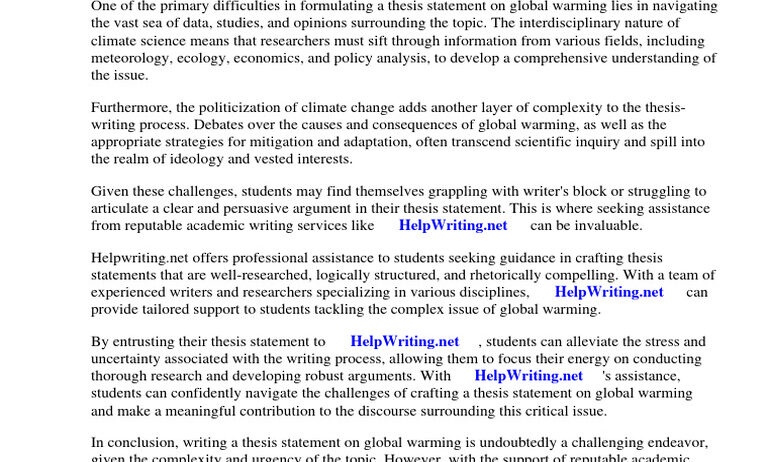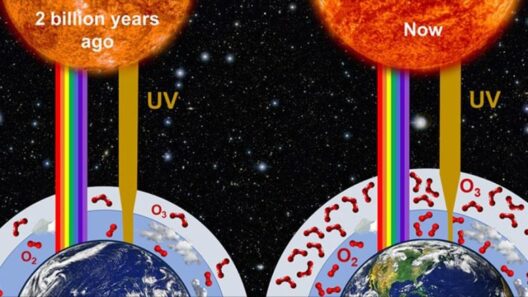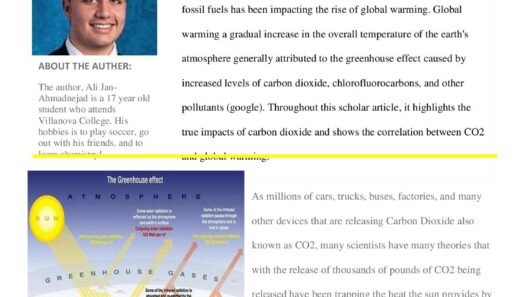In the vast ocean of academic inquiry, crafting a thesis statement for global warming research is akin to navigating through turbulent waters. The journey is fraught with challenges, yet it is a voyage worth taking for those committed to unveiling the complexities of climate change. A compelling thesis statement serves as an anchor, guiding your research and illuminating the multifaceted dimensions of this urgent issue. Here, we shall delve into various strategies for formulating a robust thesis statement that encapsulates the essence of global warming research.
To embark on this intellectual journey, one must first comprehend the significance of a thesis statement. It is not merely a declaration of intent; rather, it is a declaration of purpose. A good thesis statement encapsulates the central argument and offers a succinct preview of the research trajectory. In the context of global warming, this statement can traverse various realms—scientific, socio-economic, or political—each offering a unique lens through which to scrutinize the climate conundrum.
When acknowledging the severity of global warming, it is prudent to frame your thesis statement within the context of present-day realities. Consider the empirical data: rising sea levels, erratic weather patterns, and the alarming rate of species extinction. These stark realities can serve as poignant starting points for your thesis. For example, you might begin with, “The unprecedented rise in global temperatures has precipitated a cascade of environmental and socio-economic repercussions, necessitating immediate interdisciplinary collaboration to devise innovative mitigation strategies.” This statement not only identifies the focus of your research but also highlights the urgency of the situation.
As you refine your thesis statement, consider the metaphoric landscape; the climate crisis can be likened to a ticking time bomb. It underscores the unpredictable nature of climate impacts and the pressing need for proactive measures. Incorporating such metaphorical language can evoke stronger emotional responses and enhance the appeal of your argument. For instance, you could assert, “Global warming is a colossal beast lurking in the shadows of human neglect, demanding that we confront our environmental recklessness before it unleashes its full fury.” This imagery captures the attention of your audience, inviting them to further explore the intricacies of the issue at hand.
Moreover, specificity is vital in crafting a thesis statement that resonates. Instead of making broad assertions about climate change, hone in on particular aspects or consequences. Isolate a specific region, demographic, or policy area that exemplifies the broader narrative of global warming. For example, you might argue, “The inequities resulting from global warming disproportionately affect marginalized communities in urban settings, thus underscoring the imperative for social justice interventions in climate policy.” This specificity gives your thesis weight, providing a clear focal point for sustained inquiry and analysis.
Integrating interdisciplinary perspectives can further bolster your thesis statement. Global warming cannot be adequately understood through a singular lens; it encompasses environmental science, economics, sociology, and more. By weaving together these strands, you underscore the complexity of the issue. A potential thesis could read, “Addressing the multifaceted challenges posed by global warming necessitates a synthesis of ecological, economic, and social frameworks to cultivate resilient and sustainable communities.” This approach not only broadens the appeal but also acknowledges the interconnectedness of global warming’s effects across various sectors.
In addition to refining the subject matter of your thesis statement, the language employed is equally crucial. Employing precise and evocative terminology enhances the clarity and impact of your argument. Utilize terms such as “anthropogenic,” “resilience,” and “adaptation” to convey a depth of understanding that resonates with academically inclined audiences. For instance, “Anthropogenic emissions are catalyzing an irreversible shift in Earth’s climatic equilibrium, prompting the urgent need for comprehensive policies that promote sustainability and environmental stewardship.” Such language imbues your thesis with sophistication, enriching the discussion while appealing to scholars and policymakers alike.
Structuring your thesis statement effectively also merits attention. It is advisable to adopt a hybrid structure that combines an argumentative stance with a descriptive preview of your research direction. For example, “While the deleterious impacts of climate change threaten global biodiversity, this research posits that innovative technological solutions, when coupled with grassroots activism, can pave the way for sustainable transformation.” This hybrid approach not only posits a clear opinion but also outlines the research pathways you intend to explore, facilitating a coherent flow of ideas throughout your study.
Lastly, as you develop your thesis, consider the potential counterarguments. Acknowledging dissenting perspectives enriches your research by showcasing your critical engagement with the discourse surrounding global warming. You might declare, “Despite skepticism regarding climate change mitigation efforts, empirical evidence increasingly supports the assertion that proactive policies can not only alleviate environmental degradation but also enhance economic resilience.” This acknowledgment of alternative viewpoints enhances the rigor of your argument while affirming your commitment to a comprehensive exploration of the topic.
In conclusion, formulating a compelling thesis statement for global warming research requires a nuanced blend of specificity, interdisciplinary insights, and evocative language. By anchoring your argument in empirical reality and employing metaphoric resonance, you can craft a statement that not only articulates your research focus but also inspires engagement and action. The challenges posed by global warming are insurmountable only in the absence of informed dialogue, and a well-articulated thesis can act as a catalyst for meaningful discourse and progressive change.








